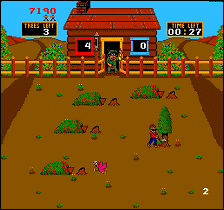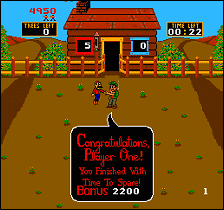 The Game: You’re a lumberjack and you’re okay. Your job is to chop down every tree that grows on the screen, without letting the trees fall on you. Birds are sometime dislodged from their nests as you chop down the trees, and they can be collected for additional points. Bears show up and throw beehives at you, which a lucky swing of the axe can destroy before they do any harm, but it’s altogether more likely that, unless dodged, a beehive will knock your lumberjack over and release a swarm of bees with their own sting operation in mind. You advance to the next level by clearing all of the trees in the time alotted; doing so with time to spare earns a bonus from the big boss; occasional bonus screens challenge you to keep your lumberjack from falling off a rolling log. (Midway, 1984)
The Game: You’re a lumberjack and you’re okay. Your job is to chop down every tree that grows on the screen, without letting the trees fall on you. Birds are sometime dislodged from their nests as you chop down the trees, and they can be collected for additional points. Bears show up and throw beehives at you, which a lucky swing of the axe can destroy before they do any harm, but it’s altogether more likely that, unless dodged, a beehive will knock your lumberjack over and release a swarm of bees with their own sting operation in mind. You advance to the next level by clearing all of the trees in the time alotted; doing so with time to spare earns a bonus from the big boss; occasional bonus screens challenge you to keep your lumberjack from falling off a rolling log. (Midway, 1984)
Memories: One of those offbeat gems that emerged in the ’80s with Midway’s relatively powerful new MCR (Midway Cart Rack) architecture, Timber is a quirky little game that has the unusual advantage of being nothing like any game that preceded it. (It’s hard to think of another game like it that came afterward, for that matter.)
 One of Timber‘s most endearing features, however, was its cooperative two-player mode. With two players trying to fill the screen with the great scent of pine, the game was both more fun and more chaotic. As felled trees pile up, the screen becomes harder to navigate, and tripping over tree trunks costs precious time. In later levels, co-op play is almost the only way to advance in the game, but it can quickly become chaotic enough to prevent much progress. It’s a beautiful thing with the right players.
One of Timber‘s most endearing features, however, was its cooperative two-player mode. With two players trying to fill the screen with the great scent of pine, the game was both more fun and more chaotic. As felled trees pile up, the screen becomes harder to navigate, and tripping over tree trunks costs precious time. In later levels, co-op play is almost the only way to advance in the game, but it can quickly become chaotic enough to prevent much progress. It’s a beautiful thing with the right players.
 As the industry continued to crumble amid stacks of copycat titles in the home video game market, it’s to Midway’s credit that its arcade designers never ceased to come up with unusual and original ideas like this. A whole slew of MCR
As the industry continued to crumble amid stacks of copycat titles in the home video game market, it’s to Midway’s credit that its arcade designers never ceased to come up with unusual and original ideas like this. A whole slew of MCR  games from this period – Timber, Domino Man, Kickman, and others – showed a defiance in the face of the “just stick (or copy) with what works” mentality that plunged the video game industry into trouble in the first place.
games from this period – Timber, Domino Man, Kickman, and others – showed a defiance in the face of the “just stick (or copy) with what works” mentality that plunged the video game industry into trouble in the first place.
